|
|
|
|
Foreword by the Chief Rabbi Lord
Sacks
I have known
of Rabbi Silberhaft’s work for some time and have been
privileged to have met him and learn of his experiences.
As spiritual leader of the country communities of the
South African Jewish Board of Deputies and African
Jewish Congress for the past 18 years, his work knows no
bounds. No request is left undealt with, no matter how
small or how large.
In the troubled circumstances in which he has operated,
Rabbi Silberhaft’s dedication and personal care are
deeply appreciated by all with whom he has come into
contact and who unhesitatingly speak of his enthusiasm
and his devotion to duty.
I am well aware of the comfort and security he has given
to so many people over so many years who are isolated
and need the spiritual and practical guidance that Rabbi
Silberhaft has so ably given. His concern for the lives
of so many and his ability to relate to each individual
and become their friends is quite unique.
Throughout this time, Rabbi Silberhaft has been the
personification of that famous Talmudic phrase: Kol
Yisrael arevim zeh la-zeh – all of Israel are
responsible for one another.
Without his commitment and enthusiasm which comes at
times of considerable personal sacrifice for his family,
many communities would cease to exist. Reading this
book, it is so heart warming to see how much he has done
to ensure that people are able to survive; that their
welfare is properly taken care of and their simple needs
for food and money are properly dealt with.
Continuously travelling across the length and breadth of
half the African continent, Rabbi Silberhaft - or The
Travelling Rabbi as he has become known – has reached
out to every Jew in love. In doing so, he has helped
enhance individuals’ and communities sense of Jewish
identity and heritage, connecting them to fellow Jews
throughout the ages.
We read in the Torah – Judaism’s most sacred text – of
Moses’ great speech to the Jewish people just before
they enter the Promised Land more than three thousand
years. Moses had led the Jewish people out of Egypt and
out of slavery. For the past 40 years, he had led them
through the Wilderness. But it had not been an easy
journey.
The Jewish people were not a nation to inspire
confidence. They were quarrelsome, ungrateful,
indecisive and at times disloyal. Yet, despite this,
Moses sensed that something great had happened to them,
something whose significance went far beyond that time,
that place and this people. He believed, he knew, that
this people would be the carriers of an eternal message,
one that would have an effect not only on itself but on
the civilisation of the world. But only if successive
generations of Jews took it upon themselves to hand down
their beliefs to their children and their children’s
children.
Just before Moses said these words he made an even more
poignant request: “You shall love the Lord your God with
all your heart and with all your soul and with all your
might” (Deut. 6:5). The sixteenth-century commentator
Rabbi Moses Alshekh was surely right when he said that
these two verses are connected. We can only pass on to
our children what we ourselves love (Moses Alshekh,
Torat Mosheh to Deuteronomy 6:6).
We cannot order our children – or anyone – to be Jews.
We cannot deprive them of their choice, nor can we turn
them into our clones. All we can do is to show them what
we believe, and let them see the beauty of how we live.
Throughout his 18 years of service, and as is shown in
this book, Rabbi Moshe Silberhaft has helped countless
number of Jews experience the beauty of Judaism. He
understands that the Jewish people has survived not just
because of an inheritance of faith, but rather because
Judaism has been bought alive in each generation and
then handed on to those generations not yet born.
What is evident from reading this book is that Rabbi
Silberhaft has a clear purpose to his work, to his
travels, to his life: to ensure people love God, love
Judaism and love simply being Jewish. Nothing could be
simpler. Nothing could be more beautiful. And, as you
will read, few people do this better than The Travelling
Rabbi, Rabbi Moshe Silberhaft.
Chief Rabbi
Lord Sacks
April 2012/Nissan 5772 |
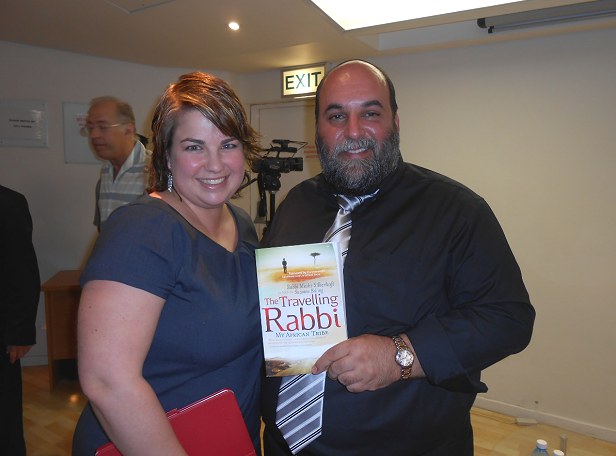
|
|
|
LAUNCH HOSTED BY JACANA, JACOB GITLIN LIBRARY & S A JEWISH MUSEUM AND LAUNCHED BY
MANDY WIENER, REPORTER AT EYEWITNESS NEWS & AUTHOR OF KILLING KEBBLE
15 NOVEMBER 2012 – CAPE TOWN
|
|
Preface
By Mandy Wiener
It is by no mere coincidence that as a 14-year-old
yeshiva bocher in the 1980s, Moshe Silberhaft found
himself journeying to a far flung town in the very
northern reaches of the country to assist in celebrating
chagim, the Jewish festivals. As the prolific Holocaust
survivor and Nobel laureate Elie Wiesel remarked, ‘In
Jewish history there are no coincidences’. It would
prove to be beshiert, an undertaking that would seem to
be pre-ordained, destined to happen. It would set him on
a life journey that would result in his making scores of
similar trips over the next 30-odd years, traversing the
country’s roads and byways as he carried the message of
Yiddishkeit with him, in his capacity as the rabbi to
the country communities in which he is affectionately
known as ‘The Travelling Rabbi’.
Over the past 18 years in that capacity, Rabbi
Silberhaft has encountered all manner of roads along the
way and many of those so succinctly mirror the
experiences he has dealt with among his community as he
serves as its spiritual leader. Each resident of every
town that falls within Rabbi Silberhaft’s congregation
has a deeply personal story to tell about a simcha or a
tragedy in which he has played a pivotal role, providing
guidance and authority where often it is lacking. He has
brought a unique intimacy and personal understanding to
the office in which he serves, and is considered a
friend to most congregants as he features prominently in
significant events throughout their life cycles, from a
baby’s bris to his barmitzvah to his marriage, and
occasionally to his funeral.
I am privileged to be able to personally attest to this.
Rabbi Moshe’s early travels to the then Northern
Transvaal introduced him to the Wieners of Pietersburg
and a close friendship developed between his family and
mine over the unfolding decades. In a fractious Jewish
community, which was waning in its twilight years, Rabbi
Silberhaft provided leadership and a sense of belonging.
He was a lifeline to a Jewish world so far removed from
the one in which we were living and he would continue to
provide spiritual and religious guidance to me long
after I had travelled the N1 south towards Johannesburg.
As a 12-year-old, I stood before Rabbi Silberhaft in the
quaint shul in Polokwane as he presided over my
batmitzvah. Sixteen years later, as a kallah under the
chuppah in the similarly atmospheric Lions Shul in
Braamfontein, Rabbi Silberhaft married my husband and
me. He also officiated at the marriages of both of my
siblings, and has become a dear friend to my father over
the years. He has been present in times of celebration
and of difficulty. He has even fulfilled what is surely
one of the most bizarre requests made of a country
community rabbi – hosting my father’s beloved Labrador
for a week while my parents prepared to make aliyah!
This is precisely the attribute that has endeared Rabbi
Silberhaft, the shepherd, to his vastly disparate flock.
He has empathy, and a profound understanding of each of
his congregant’s circumstances. He does not cast
judgment, nor does he force upon any of his members that
to which they do not voluntarily subscribe. In the words
of my father, ‘He has the ability to talk with kings and
presidents at one moment and the next, to break bread
with ordinary men, of whatever colour, creed or
religion.’ Regardless of a Jew’s level of devotion, they
are welcomed into the fold with a kind word and a kosher
meal. When Rabbi Silberhaft’s car makes an appearance on
a dusty platteland road or in some forgotten backwater,
it brings with it far more than its mere practical
contents. There is no doubt a boot brimming with kosher
meat, Kiddush wine, newspapers, calendars and other
paraphernalia, but, more importantly, Rabbi Silberhaft’s
appearance brings a familiarity, a belonging, an
acknowledgement of what it is to be Jewish.
As he has crisscrossed the country and the 12
sub-Saharan countries which he covers, Rabbi Silberhaft
has dedicated himself towards his obligation to unite
the Jewish community, rather than perpetuate separation.
While he encourages members to become more observant and
more actively involved in their religion, he accepts
them for what and who they are. For him, above all, a
Jew is a Jew.
I have had the good fortune to travel many roads, both
literally and figuratively, with my rabbi and close
friend. Over the following pages, you too will be
allowed that privilege. It is a journey that features
the colourful characters of the gramadoelas, remarkable
tales of faith and devotion and oozes the warmth and
sincerity of the Jews of the country communities. It is
the story of a travelling rabbi and his unique African
tribe.
Mandy Wiener
Special Investigative Reporter
Author of Killing Kebble: An Underworld Exposed |

|
|
|
LAUNCH HOSTED BY “THE BOOK LOUNGE” – IN CONVERSATION WITH PHILIP KRAWITZ
14 NOVEMBER 2012 – CAPE TOWN
|
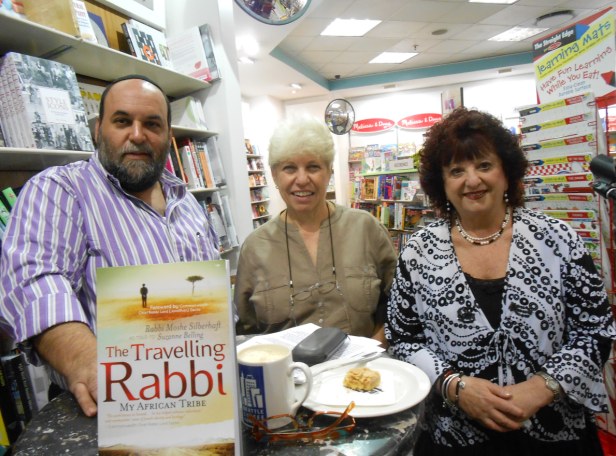
|
|
|
LAUNCH HOSTED BY EXCLUSIVE BOOKS, KILLARNEY BRANCH – 25 OCTOBER 2012
It is written in our sacred Jewish texts that in every generation
sparks from the soul of our teacher Moshe Rabbeinu ‘descend and
clothe themselves in the body and soul of the sages of that generation’.
There is no doubt that the sparks of these leadership qualities, with
almost a realisation of prophetic vision – or was it Hashgacha Pratit
(Divine Providence)? – that put a young man, Moshe Silberhaft,
our prophet’s namesake, in the right place at the right time to assume
responsibility and leadership for so many of our forgotten Jews.
– Suzanne Belling
|
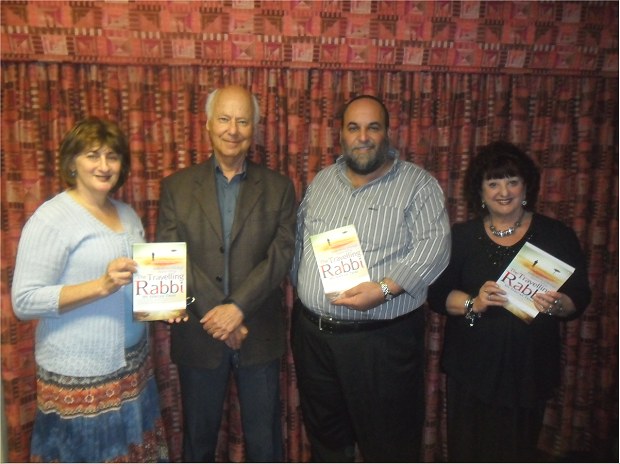
|
|
|
LAUNCH HOSTED BY THE PRETORIA COUNCIL OF THE JEWISH BOARD OF DEPUTIES THROUGH ITS
“NEWS & VIEWS” PROGRAM – 24 OCTOBER 2012
|

|
|
|
LAUNCH HOSTED BY THE PORT ELIZABETH – UNION OF JEWISH WOMEN BRANCH – 4 OCTOBER 2012
|
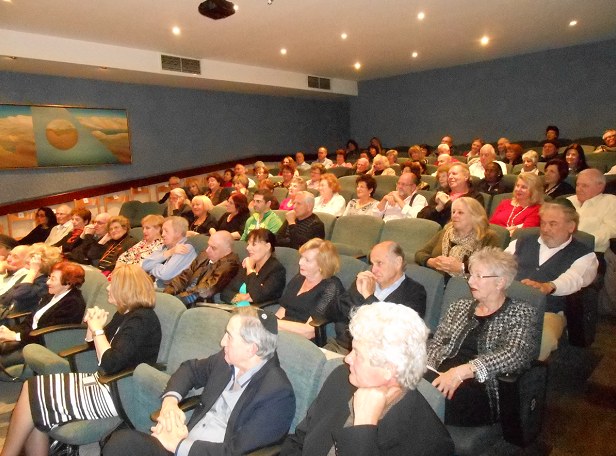
|
|
|
LAUNCH HOSTED BY RABBI CYRIL HARRIS COMMUNITY CENTRE and THE UNION OF JEWISH
WOMEN OF SOUTH AFRICA – 12 SEPTEMBER 2012
|
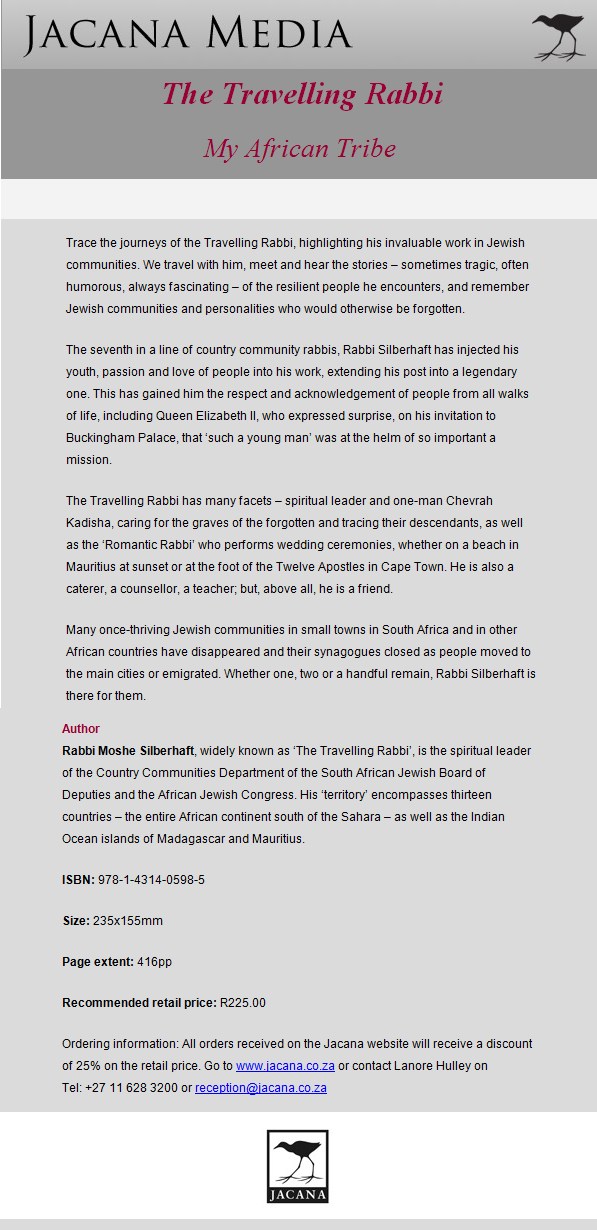
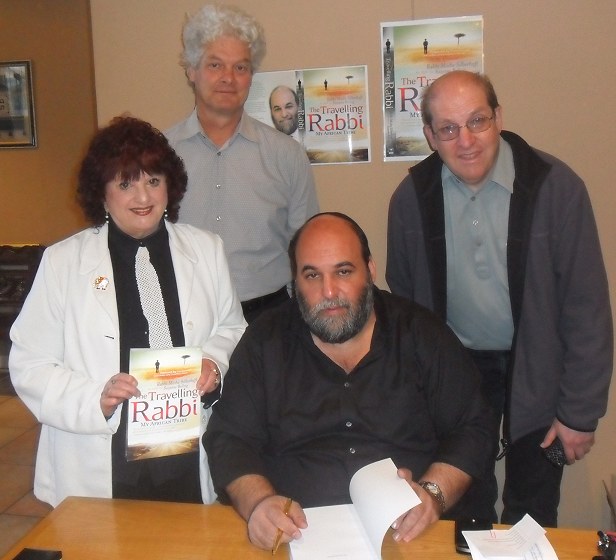
|
|
|
“The Travelling Rabbi: My African Tribe” by Rabbi Moshe
Silberhaft as told to Suzanne Belling was launched at
Beyachad on Sunday, September 9 by Jacana, the
publishers, and at the Rabbi Cyril Harris Community
Centre the following Wednesday evening by the Union of
Jewish Women. In the picture Rabbi Silberhaft signs a
copy of the book while Suzanne Belling, publisher Mike
Martin and Gus Silber, guest speaker at the first
launch, look on. Photograph by Mike Belling |
For well-known journalist, author and filmmaker Gus Silber, the SAJBD’s ‘Travelling Rabbi’ Moshe Silberhaft has a job to be envied. Few people, after all, have the opportunity of visiting so many remote and interesting corners of the country and establishing a first-hand rapport with South Africa’s multifaceted communities.
Silber was speaking at Sunday’s launch at Beyachad of ‘The Travelling Rabbi: My African Tribe”, Rabbi Silberhaft’s new book recounting his eighteen years and counting as Spiritual Leader to the SA Country Communities and also to the countries affiliated to the African Jewish Congress. The hefty 360-page tome, which includes numerous color illustrations, is replete with insights and anecdotes that bring alive not only aspects of Jewish country and small town life, but life outside the main urban center in general. As such, it will make enjoyable reading for anyone interested in getting to the tachlis of what it means to be a South African. It was co-written with veteran journalist and Jewish communal professional Suzanne Belling, a former editor of the SA Jewish Report, and is published by Jacana Media.
Silber’s entertaining presentation was illustrated with clips from his 2011 documentary ‘Shalom The Beloved Country’, an intimate on-the-road look at Rabbi Silberhaft’s work in rural South Africa, Zimbabwe and elsewhere. In making the documentary, he accompanied the rabbi on a number of his visits, recording his interaction with remaining Jewish residents, his inspection of the cemeteries and meetings with members of the larger community with whom he works. It was a project close to Silber’s heart, given his own background growing up in Potchefstroom in what was then a sizable Jewish community. Few Jews today remain in the country areas and small towns, but the legacy they left has not been forgotten.
Rabbi Silberhaft’s forthright, no-nonsense approach to his work, combined with an approach to those he ministered to, including those who were inter-married, that was completely non-judgmental were identified by Silber as reasons for his success. In addition, he had the instincts of a true sleuth in his ability to track down a Jewish link in the places he visited, be it a living individual, a grave or a building. Through his work, he had become the public face of the Jewish world for innumerable people living far from the Jewish population centers and for many Jews their only link with their Jewish heritage and the greater Jewish world.
Rabbi Silberhaft is seventh in a line of rabbonim who have held the post of spiritual leader to the country communities since the establishment of the SAJBD’s Country Communities Department in the early 1950s. Without belittling his predecessors’ achievements, however, he has succeeded in imprinting his own vision and personality on that position that has created for himself a unique profile, not just in South Africa but across the Jewish world. This is in no small part attested to by the fact that the foreword was contributed by Rabbi Lord Jonathan Sacks, outgoing Chief Rabbi of the Commonwealth and with whom Rabbi Silberhaft has had extensive dealings.
Silber’s address was preceded by a short message from Judge Ralph Zulman, the current Chairman of the SAJBD Country Communities division. He paid tribute to Rabbi Silberhaft for his extraordinary dedication, and for the multiple inter-personal and organizational skills he brought to bear in carrying out his multi-faceted functions.
|
|
Some Perspectives
I am delighted and honoured to write about a truly remarkable
man, Rabbi Moshe Silberhaft. I have had the pleasure to
meet him on many occasions, in my role as president of
the Commonwealth Jewish Council. I have seen first-hand,
the vital work that Moshe does, to ensure that the Jewish
communities in the sub-Saharan African countries – especially
the smaller ones – are able to continue their Jewish customs
and heritage, whether through services, simchas, availability
of kosher food, or even through receiving medical and other
essential supplies.
There is a deep history, culture and legacy of the large
Jewish communities that once lived in those countries. Sadly,
today, many of these communities have dwindled in size, but it
is the dedication and passion of Moshe that keep those Jewish
communities thriving – and that is a wonderful achievement.
Mazel tov and may your great work continue for many years
to come.
Lord [Greville] Janner of Braunstone,
QC
President, Commonwealth Jewish Council
During the apartheid years in South Africa, we were shunned
by the international communities and it was impossible to make
inroads into the neighbouring states to interact with the Jews
living there.
But, with the release of Nelson Mandela and the end of
apartheid, Seymour Kopelowitz, a former national director of
the South African Jewish Board of Deputies, and I decided to
create an African Jewish Congress to strengthen South Africa
with the Jewish community internationally as well as place us in
a position to influence leaders in African countries.
The inaugural meeting was in Harare, Zimbabwe, in 1993,
as this was the country of our main focus. Ilan Steinberg, the
deputy director of the World Jewish Congress – to which we
were informally attached and into which we were more recently
formally accepted – flew from New York to open the congress.
I welcome the launch of this book detailing the travels of
Rabbi Moshe Silberhaft, who is universally liked and admired.
This has to do with his personal interaction with individual
Jews in small, even isolated, communities. Their only one-on one
contact with a pastoral rabbi is Moshe Silberhaft. He is their
rabbi as much as if they lived in a mainstream South African
community with a synagogue and spiritual leader. They don’t
have that, but they have him.
Many of these Jews are married out of the faith and are
halachically ignorant about the rituals of Judaism. But Rabbi
Silberhaft treats them, one and all, as full Jews and is totally
understanding of their own uncertainties. He helps them
through these in a caring and supportive manner, which is
evident in this book.
Personally, I find him efficient, savvy and quick to grasp
issues. He knows his turf – and he knows it well.
Mervyn Smith
Founding president of the African Jewish Congress,
a vice-president of the World Jewish Congress
and past national chairman
and president of the
South African Jewish Board of Deputies
I always make a division between the work that Rabbi Moshe
does inside South Africa and that which he does in neighbouring
states. In my mind, they have a different emphasis.
As a member of a country community, I know how much his
visits and contacts are appreciated by those who live outside the
big communities but who are still determined to be part of the
South African Jewish heritage. He brings spiritual and religious
support as well as practical advice and expertise. But perhaps
the most important thing is that he makes his flock feel that
they are still part of a vibrant and active community and that
their contribution to Jewish life, however small, is an important
component of the whole.
Now for the ‘neighbouring states’. People often ask, why do
Jews remain in these far-flung outposts? The answer is that for
as many Jewish people as there are, there are as many reasons!
And often the reasons are private and must be respected as
such. Rabbi Moshe understands these feelings and handles
many difficult situations sympathetically but firmly. He has the
ability to give his congregants the confidence to uphold as many
aspects of Jewish life as are practical. He has an amazing knack
of being non-judgmental. That spiritual support is as important
to them as physical or emotional support.
Ann Harris
Vice-president, African Jewish Congress
This is a timely book recognising the distinguished career of
a seasoned Jewish communal worker.
Rabbi Moshe Silberhaft possesses all the personal attributes
required of his demanding job. He is not only a spiritual
leader, but also a skilled diplomat. He is a social entrepreneur,
a welfare worker, a trouble-shooter and a problem-solver. He
is the glue that holds together a small and scattered flock,
striving to preserve the Jewish mitzvot. To the governments of
the countries he visits, he represents the civil face of the global
Jewish people.
Michael Schneider
World Jewish Congress emeritus secretary-general
and former CEO of the American Jewish Joint Distribution Committee
I have known Rabbi Moshe Silberhaft for close on the entire 18
years that he has served the community. In more recent years I
have had the privilege, as chairman of the South African Jewish
Board of Deputies Country Communities Committee, to work
closely with the rabbi.
His dedication to his task is quite remarkable. He has
accurately been described as ‘The Travelling Rabbi’. He has
travelled the length and breadth of South Africa visiting its
diminishing far-flung Jewish communities. Indeed, he numbers
his flock not only among the few remaining Jews in these places
but also beyond our borders in Zimbabwe, Mauritius, Zambia,
Namibia and elsewhere in sub-Saharan Africa.
In my view he is truly the face of our community who is
known to those who would otherwise be forgotten Jews.
No task, be it presiding at a wedding, a bris, a barmitzvah or
a funeral or the setting of a tombstone, amongst other duties,
whenever there is a need and wherever it may be, is neglected
by him.
I wish him well. May the Almighty grant him many more
years in good health to continue his important work.
Judge Ralph Zulman
Chairman, South African Jewish Board of Deputies
Country Communities committee
Rabbi Moshe Silberhaft has for many years, with great dedication
and kindness, served the Jews of the country communities across
South Africa, and in many other African countries as well. This
fascinating book, filled with colourful anecdotes and interesting
nuggets of history, is an opportunity to get a glimpse of Rabbi
Silberhaft’s well-known, warm and tenacious commitment to
all those he serves. The stories and events recorded in this book
teach us all about the power of compassion and loyalty to uplift
the lives of all those we come into contact with.
Rabbi Dr Warren Goldstein
Chief Rabbi of South Africa |
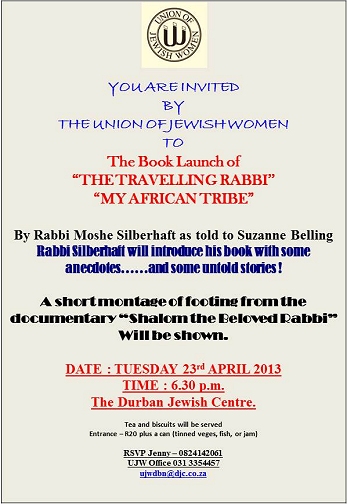
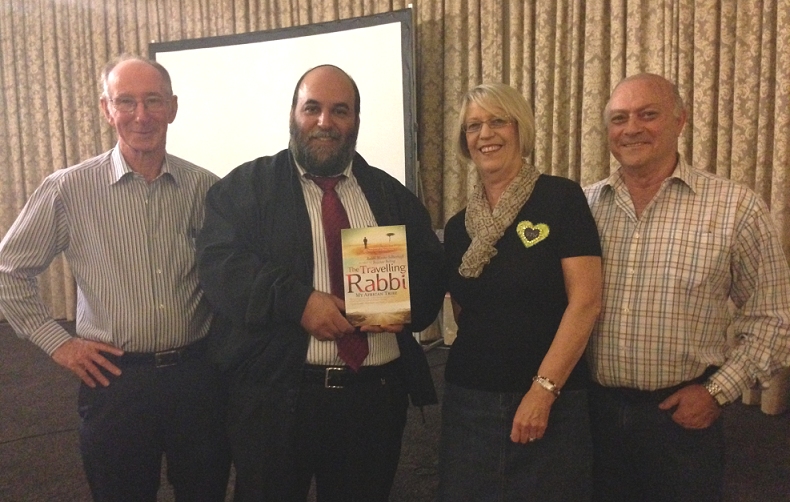
|